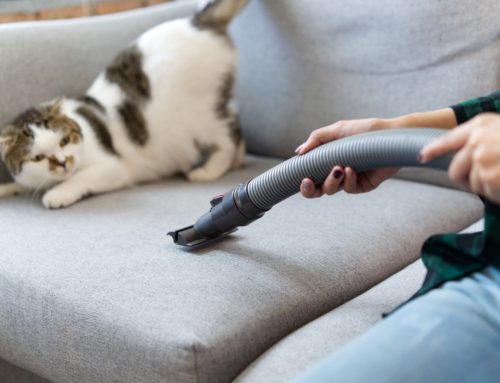Does your pet regularly cower in the corner or hide under the bed when they hear a loud noise? They could have a noise aversion (i.e., excessive fear associated with certain sounds), a condition that—shockingly—affects roughly one-third of all dogs, and is one of the most frequently diagnosed problems in family pets. But, what exactly is noise aversion, and what can pet owners do to alleviate their pet’s discomfort? Read on to learn more.
What is noise aversion in pets?
While many of us may startle at a loud thunderclap or a backfiring car, noise aversion is an exaggerated response to an auditory stimulus. If your pet briefly jumps, barks, or whines after an alarming noise, but then goes back to their previous activity, worry not, because this is a normal reaction to an unexpected sound. However, after your pet hears the alarming sound, if they spend the rest of the evening curled up in the closet, pacing by the window, or shaking in their bed, you are likely dealing with a noise-averse pet.
Pets can be noise averse to predictable sounds, such as fireworks or rain storms, but everyday noises, like doorbells, garbage trucks, and other street noises, may trigger some pets’ fear. If you aren’t sure if your pet’s response is normal, record what you observe, and then contact our Billings Animal Family Hospital team to set up a consultation. A video made during one of your pet’s episodes will be helpful in diagnosing these conditions.
What causes noise aversion in pets?
With your veterinarian’s help, you may be able to pinpoint an exact cause for your dog’s noise aversion. Sometimes, the condition can be attributed to a single traumatic event that led to a fearful response that went unaddressed. Lack of habituation to certain sounds can be another possible cause. A pet who isn’t regularly exposed to these triggering noises may have a distorted response. Often, affected pets have a vague history, with little known about their circumstances and development, and these pets may have concurrent separation anxiety, aggressive tendencies, or other behavioral concerns.
How do I know if my pet has a noise aversion?
Common canine noise aversion signs are similar to the signs in a person having a panic attack, and can range from subtle to obvious. Affected pets may tremble, yawn, lick their lips, pant, hide, vocalize or whine, eliminate inappropriately, or attempt to escape. Since mild signs can be easily missed, pay careful attention to your pet’s reaction to loud noises, and note if they become more severe over time.
What can I do if my pet has a noise aversion?
Fortunately, pets with fear and anxiety related to sounds can be managed, but figuring out what works for your pet may require trial and error, including the following steps:

- Consult your veterinarian — First, seek veterinary attention to rule out any medical explanation for your pet’s signs, as certain painful conditions can exacerbate noise sensitivities.
- Make a therapy plan — Next, our veterinary team will work with you to determine the best therapy for your individual pet, which may include behavioral training, pharmaceutical or supplemental treatments, and environmental changes to reduce fear associated with certain noises
- Follow our tips — Helpful tips include:
- Adopting a gentle tone when a trigger noise arises, offering positive reinforcement so your pet will develop a beneficial association
- Avoiding giving your pet too much attention, as this may have the opposite effect, and cause your pet to become codependent
- Making socialization a priority for young pets—this has been shown to positively affect adult behavior and acceptance
Can I wait to address my pet’s possible noise aversion?
If your pet’s noise aversion appears mild, you may be tempted to delay addressing the problem. However, pets with a noise aversion generally become worse and harder to manage. Therefore, responding to your pet’s mild noise aversion now means they have a better chance of permanently overcoming their fear—something all pet owners should strive to achieve.
Do you think your pet may have a noise aversion? Take this online quiz and contact Billings Animal Family Hospital to set up a consultation to get your pet back on the path to fear-free living.








Leave A Comment